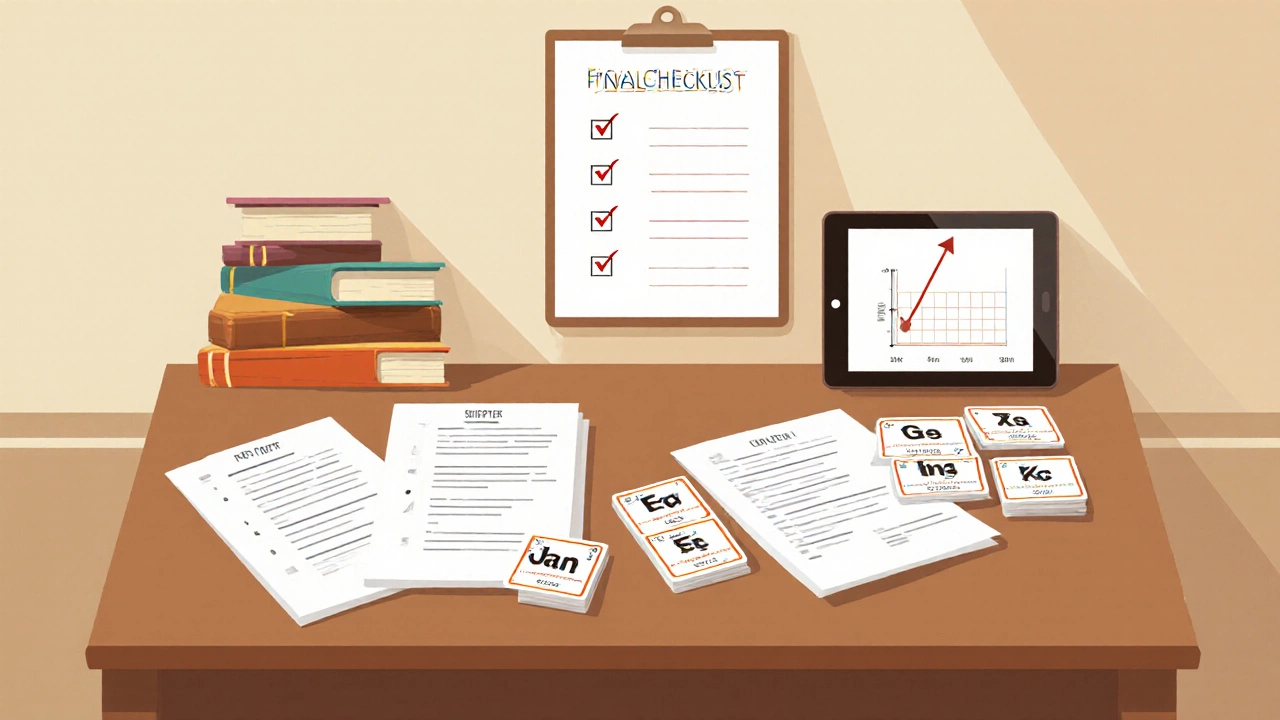
JEE Subject Difficulty Assessment Tool
Personalized Subject Difficulty Assessment
Identify your toughest subject and get targeted strategies
Take the 30-Second Assessment
Answer these questions to understand which subject might be most challenging for you.
Your Personalized Analysis
Your Toughest Subject
Why This Subject Might Be Challenging For You
Your Customized Action Plan
Remember
The article explains that Physics has the lowest average score (27%) but individual difficulty varies. Your personalized strategy helps overcome your specific challenges.
When students ask, “JEE - the Joint Entrance Examination - is the toughest gateway to Indian Institutes of Technology - they wonder which subject gives them the biggest headache?” The answer isn’t a one‑size‑fits‑all label; it depends on scoring trends, question styles, and personal strengths. This guide breaks down the three core subjects, shows real data from 2022‑2024 JEE‑Advanced papers, and hands you practical tactics to turn the toughest topic into a manageable one.
Key Takeaways
- Across the last three years, Physics has the lowest average score, making it statistically the hardest subject for most candidates.
- Mathematics outranks Chemistry in conceptual depth, but its scoring curve is less volatile.
- Targeted practice -focused problem‑sets, timed mock tests, and concept‑first study -reduces the difficulty gap dramatically.
- Use the comparison table below to spot where you need the most effort.
- Follow the subject‑specific tips to improve speed, accuracy, and confidence.
Understanding the JEE Structure
The JEE ecosystem consists of two stages: JEE Main (screening) and JEE Advanced (final selection). Both exams test Physics, Chemistry, and Mathematics, but the weightage and question formats differ.
- JEE Main: 90 questions (30 per subject), mix of multiple‑choice and numerical answer type.
- JEE Advanced: 96 questions (≈32 per subject), includes single‑correct, multiple‑correct, integer‑type, and match‑the‑column.
Because the Advanced paper is where seat allocation happens, most aspirants focus their preparation on difficulty patterns observed in this stage.
Subject‑Wise Difficulty Analysis
Physics - The Statistical Heavyweight
Historical data from 2022‑2024 shows an average score of 27% in Physics, compared to 31% in Chemistry and 34% in Mathematics. The lower average stems from three factors:
- Conceptual depth: Topics like electrostatics, optics, and modern physics demand both qualitative understanding and quantitative precision.
- Multi‑step problems: A typical Physics question combines three or more concepts, increasing the chance of error.
- Time pressure: Physics often requires diagram drawing or vector analysis, which can be time‑consuming.
Students who rely solely on memorizing formulas tend to stumble here. The subject rewards a strong grasp of fundamentals and the ability to translate a physical situation into mathematical language.
Chemistry - The Mixed Bag
Chemistry splits into Physical, Organic, and Inorganic sections. Its average score hovers around 31%, making it easier than Physics but tougher than Mathematics for most candidates.
- Physical Chemistry mirrors Physics in problem‑solving intensity (thermodynamics, kinetics, electrochemistry). Missteps often arise from weak algebraic manipulation.
- Organic Chemistry is concept‑driven. Knowing reaction mechanisms and functional group interconversions is key.
- Inorganic Chemistry is fact‑heavy but comparatively scoring; memorizing trends (periodic properties, coordination chemistry) pays off.
Students who balance rote memorization with practice problems usually score well. The main pitfall is under‑preparing for the calculation‑heavy Physical part.
Mathematics - The Calculus Playground
Mathematics averages the highest score at 34%. Its difficulty lies in speed rather than depth. Core topics - calculus, algebra, coordinate geometry, and vectors - are familiar from the CBSE syllabus but are tested at a higher abstraction level.
- Calculus (limits, continuity, differentiation, integration) appears heavily, and mistakes often stem from missed conditions or sign errors.
- Algebra (matrices, determinants, complex numbers) demands precise manipulation.
- Geometry (conic sections, three‑dimensional geometry) requires spatial visualization.
Students who practice timed problem sets and learn quick shortcuts (e.g., using symmetry or standard results) typically outperform peers.

Data‑Driven Perspective: Scores & Question Distribution
| Subject | Avg. Score (%) | Single‑Correct Qs | Multiple‑Correct Qs | Integer/Numeric Qs |
|---|---|---|---|---|
| Physics | 27 | 38 | 40 | 22 |
| Chemistry | 31 | 42 | 35 | 23 |
| Mathematics | 34 | 45 | 37 | 24 |
The table shows that Physics not only scores lower but also carries the highest proportion of multiple‑correct questions, which are notorious for penalizing careless guesses.
Why Do These Subjects Feel Hard?
Difficulty perception is a mix of external factors (exam design) and internal factors (learning style). Below is a quick taxonomy:
- Conceptual depth - Physics and Physical Chemistry demand a solid mental model of real‑world phenomena.
- Problem‑solving layers - Multi‑step calculations increase cognitive load.
- Time‑intensive visualisation - Diagrams, vector drawings, and 3‑D geometry slow down many candidates.
- Memory load - Inorganic Chemistry and some Organic reactions rely heavily on rote recall.
Identifying which of these blocks you hit most helps you choose the right remedial strategy.
Subject‑Specific Action Plan
Physics - Build a Concept‑First Framework
- Start with NCERT (NCERT textbook). Read the theory, then immediately solve the end‑of‑chapter questions.
- Visualise before you calculate: sketch free‑body diagrams, field lines, or circuit schematics first.
- Use “one‑formula‑per‑concept” sheets to avoid mixing similar equations.
- Practice multi‑step problems daily. Set a timer for 15 minutes per problem to improve speed.
- Revise with short video explanations (e.g., by top JEE YouTube channels) to reinforce concepts.
Chemistry - Blend Memory with Maths
- Create periodic‑table flashcards for oxidation states, common ions, and coordination geometry.
- Write reaction mechanisms repeatedly - the physical movement of electrons becomes second nature.
- Solve Physical Chemistry numerical sets in batches; focus on unit consistency and sign conventions.
- Link concepts across sections: use thermodynamics to explain reaction spontaneity in Organic chemistry.
- Take weekly mock tests and review every error, categorising it as “conceptual”, “numerical”, or “memory”.
Mathematics - Speed Through Patterns
- Master core formulae (e.g., sum of series, binomial theorem) and practice their direct application.
- Develop shortcut techniques such as using symmetry in coordinate geometry or determinant properties for linear equations.
- Practice timed drills: 20 questions in 30 minutes, then review mistakes thoroughly.
- Use past JEE‑Advanced papers to identify recurring question patterns (e.g., transformation geometry).
- Maintain an error log for sign mistakes, incorrect limits, and missed conditions.

Quick Checklist Before the Exam
- Have you solved at least 150 Physics multi‑step problems from the last three years?
- Can you write the complete mechanism for 5 major Organic reactions without looking?
- Do you finish a 30‑question Mathematics mock in under 45 minutes?
- Is your formula sheet for each subject under one A4 page?
- Did you review every mock test error and categorize the root cause?
Common Pitfalls & How to Avoid Them
- Rushing through diagrams - allocate 30seconds to draw a clean figure before solving.
- Skipping units - always write the unit after each intermediate step; it prevents mismatch errors.
- Memorising without understanding - use the “explain it to a friend” technique to test true comprehension.
- Over‑relying on one resource - combine NCERT, a reference book (e.g., H.C. Verma for Physics), and video tutorials.
- Neglecting mock test analysis - simply taking a test isn’t enough; deep‑dive into every wrong answer.
Frequently Asked Questions
Is Physics always the hardest subject for every JEE aspirant?
Statistically, Physics has the lowest average score, but individual difficulty varies. Students strong in visualisation and applied mathematics may find Chemistry or Mathematics tougher. Identify your personal weak spots before deciding where to focus.
How many hours should I allocate weekly to the hardest subject?
A balanced plan works best: 10‑12 hours for the hardest subject, 6‑8 for the other two, plus 4‑5 hours for full‑length mock tests. Adjust based on mock scores; if your Physics score lags, shift an extra 2‑3 hours there.
Do online video lectures replace textbook study?
Videos are great for concept clarification, but textbooks (especially NCERT) contain the depth required for JEE‑Advanced. Use videos as a supplement, not a substitute.
What’s the best way to improve speed in Mathematics?
Practice timed drills daily, learn shortcut formulas, and solve previous year JEE‑Advanced problems to recognize patterns. After each drill, review the time spent on each question and aim to shave off 5‑10 seconds per problem.
How important is the mock test analysis?
It’s crucial. A mock test without analysis is just practice. Categorise each mistake, note recurring themes, and create a focused revision plan targeting those gaps.
